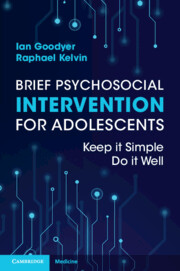Book contents
- Brief Psychosocial Intervention for Adolescents
- Brief Psychosocial Intervention for Adolescents
- Copyright page
- Contents
- Acknowledgements
- 1 Adolescence and the Psychotherapies
- 2 Evidence-Based Psychotherapy
- 3 Evolving the BPI Method
- 4 The Evidence Base for BPI
- 5 Practice Framework and Clinical Principles
- 6 Clinical Styles and Therapy Tools
- 7 BPI in Clinical Practice: Part One
- 8 BPI in Clinical Practice: Part Two
- 9 Top Tips for Best Practice
- Index
- References
1 - Adolescence and the Psychotherapies
Published online by Cambridge University Press: 16 March 2023
- Brief Psychosocial Intervention for Adolescents
- Brief Psychosocial Intervention for Adolescents
- Copyright page
- Contents
- Acknowledgements
- 1 Adolescence and the Psychotherapies
- 2 Evidence-Based Psychotherapy
- 3 Evolving the BPI Method
- 4 The Evidence Base for BPI
- 5 Practice Framework and Clinical Principles
- 6 Clinical Styles and Therapy Tools
- 7 BPI in Clinical Practice: Part One
- 8 BPI in Clinical Practice: Part Two
- 9 Top Tips for Best Practice
- Index
- References
Summary
The Notion That The Teenage Years Have Any Particular Value In Social, Cultural Or Biological Terms Does Not Appear In Any Literature Until The Fifteenth Century. Before Then, Received Wisdom Was That Infancy And Childhood Were Followed By Adulthood And All That Goes With Being A Grown-Up Individual In Any Society. The Word ‘Adolescence’ Came From The Latin Word Adolescere, Meaning ‘To Grow Up Or To Grow Into Maturity’. Although Ongoing Maturation During The Teenage Years Is Clearly Suggested, There Appears To Be No Formal Adoption Of The Concept In Any Society Until The Early Twentieth Century. In 1904 The First President Of The American Psychological Association, Greville Stanley Hall, Was Credited With Coining The Term ‘Adolescence’. In His Study Entitled Adolescence, He Described This New Developmental Phase, Which He Hypothesised Came About Due To Social Changes. Some Of This Hypothesis Resonates Clearly With Today’S Viewpoints, Although Much Is Also Now Known To Be Incorrect.
- Type
- Chapter
- Information
- Brief Psychosocial Intervention for AdolescentsKeep it Simple; Do it Well, pp. 1 - 11Publisher: Cambridge University PressPrint publication year: 2023



